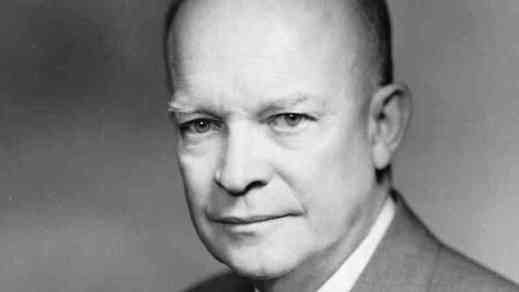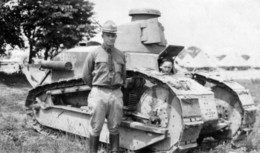






Men Of Action -- Dwight D. EisenhowerEisenhower Augments His Salary At West Point With Poker |
|
|

Dwight Eisenhower learned how to play poker from a man who lived on a river in Abilene, Kansas. His name was Bob Davis. He was nearly illiterate, yet Eisenhower called him one of his heroes.
“My hero was a man named Bob Davis. He had long been a traveler, a fisherman, hunter, and guide. He was also a bachelor, a philosopher, and, to me, a great teacher. One thing he taught me, without sanctions, was the rudiments of poker,” Eisenhower wrote in his At Ease: Stories I tell my Friends.
Ike knew him from the age of 8 until he left to go to West Point in 1911. The story continues in Matthew Holland’s Eisenhower Between the Wars: The Making of a General and Statesman.
“Although an illiterate, Davis was something of a mathematical genius. Eisenhower remembered that Bob ‘knew poker percentages’ better than anyone. He taught Ike that poker was a game of logic. On their fishing and hunting trips, Bob ‘dinned percentages into my head night after night around a campfire.”
He would deal “Little Ike” hand after hand, testing and scoring him, hammering his poker theory home. So much of Eisenhower’s life would be running drills and war games, and this had to have been his first taste of it, happily listening to a 50-some-year-old mountain man talking about poker.
This was in the early 1900s, when Ike was nothing but a boy running around the woods of Kansas. The poker lessons apparently stuck. By the time he got to West Point, he was heads and shoulders above most of his classmates as a poker player thanks to Bob Davis, the philosopher.
Again, from Matthew Holland: “At West Point and during his career between the wars, Ike augmented his salary by playing poker. He quickly learned that most officers knew ‘nothing about probabilities.’ By avoiding any emotional playing and following only the percentages, Ike became a ‘regular winner.’”
 It was said he’d rather play poker than go to dances and he and his classmates went to great extremes to hide their poker games from the upperclassmen who were assigned to keep an eye on the plebes. They stationed look-outs and developed a communication system to warn them of incoming upperclassmen. For the boys, it was as fun getting away with it as it was playing in the game.
It was said he’d rather play poker than go to dances and he and his classmates went to great extremes to hide their poker games from the upperclassmen who were assigned to keep an eye on the plebes. They stationed look-outs and developed a communication system to warn them of incoming upperclassmen. For the boys, it was as fun getting away with it as it was playing in the game.
By the time Eisenhower graduated from West Point in 1915, his game was razor sharp. He once turned two silver dollars into more than $100 in a game back home. He also bought his future wife Mamie an expensive jewelry box for Christmas that year, most likely with winnings from poker.
During his first deployment, he was invited to a poker game by a former classmate, Mark Clark. This was Major General Walter C. Sweeney’s regular game. One night they were short on players and Clark, vouching for Ike, got him a seat. By the end of the night, the Major General was not happy.
“By the time the game ended Eisenhower’s wallet was very much fatter. His victims included both Clark and Sweeney, who glared at Clark and groused, ‘What do you mean bringing a ringer into the game?’” wrote Carlo D’Este in Eisenhower: A Soldier’s Life.
“Eisenhower is not known to have been invited back.”
Patton v. Eisenhower
In the early part of 1919, Eisenhower was sent to Camp Meade in Maryland, where George Patton already was in command of one of two Tank Corps. Eisenhower was assigned command of the other, and the two were given the task to re-evaluate tank warfare. They each had their team and acres of land to work out their theories they surely went to sleep thinking about. These were two of the most competitive men the army ever seen, and they drove each other like a set of tracks over a muddy field.
And two times a week they played poker, along with other officers with expertise in military strategy. This probably wasn’t the easiest game in the army and just countering the methods most likely used by an aggressive Patton and a more nuanced Eisenhower would be madding in itself. And Patton had money to burn, while Eisenhower only had what he earned, which is like tightening a well-tuned drum.
It was true consequence, a good poker education, odds management and a strong desire to always tough out a win versus aggression, deep pockets, and pomp. Both were stubborn and extremely social men, and surely the competitiveness and hugeness of characters present would have given to moments of pure poker joy.
The differences between the two men were stark. Patton lived a privileged life. His family had wealth and military fame, and he purposefully walked the Earth as a prideful soldier, a man among men. He believed in reincarnation and thought, over and over, he was born a soldier, he was exactly who he should be.
His philosophy: “Nobody ever defended anything successfully, there is only attack and attack and attack some more.” There’s also “We are advancing constantly and we are not interested in holding onto anything, except the enemy’s balls.”
 Eisenhower was a son of railroad mechanic. A natural athlete, he grew up popular in Abilene, Kansas, boxing, playing football, hunting and fishing – a big man in a very small town. He couldn’t stand to lose, but he was more open to other tactics and was considered the more flexible of leaders between the two.
Eisenhower was a son of railroad mechanic. A natural athlete, he grew up popular in Abilene, Kansas, boxing, playing football, hunting and fishing – a big man in a very small town. He couldn’t stand to lose, but he was more open to other tactics and was considered the more flexible of leaders between the two.
Again from Eisenhower: A Soldier’s Life: “This was a serious rivalry between two of the most competitive men the army has ever known. Debates and arguments constantly raged, and wagers made between the two until the demise of the Tank Corps in 1921 caused the breakup of rifle teams.”
There were often shouting matches and real danger. A cable snapped and once nearly decapitated the two. Live shells were used and sometimes malfunctioned. They put the slow and ultimately inefficient tanks through war games and every situation they could think of. It must have been a great summer for them, both at the beginning of their military careers and doing fine for themselves. They were in their early 30s, with Patton being older by five years.
By day Patton and Eisenhower scrimmaged on the vast fields of Camp Meade, testing strategy, tearing apart tanks, putting the machines and each other through hell. Most nights, they would end up at one or the others homes and poured over existing tank strategy while developing their own. They graded each other and published their theories in journals dedicated to warfare.
According to Eisenhower, it was Patton who insisted on the bull sessions: “He said, ‘Let’s you and I solve these together’… I worked the problems with him… and got a lot of fun out of it. We’d go to his house or my house and the two of us would sit down, and while our wives talked for the evening, we would work the problems… and grade ourselves.”
Think about how all this spilled over into the twice-weekly poker games. Did Patton forever attempt to demonstrate his theories of aggression? Did his wealth – and his high attitude and fame – cause him to attempt moves not in his best interest? How did Eisenhower go about setting traps and extracting money from his weary opponents who surely knew how tight and wily a player he was. Who did they fear more? Who was the winner and who was the loser? How much whiskey did they drink?
By the end of 1921, the work that Patton and Eisenhower did for advancing the theories of tank warfare only got the two into trouble. Their findings were called dangerous and irrational – it was an example of older commanding officers failing to see the future and feeling threatened by young upstarts with radical ideas. Less than 20 years later, the Germans would conquer Europe with a major help from their tank battalions that used aggressiveness very similar to the strategies championed by Patton and Eisenhower during those months playing poker with giant machines.
Unlike Nixon, who Eisenhower would pick as a running mate for the 1952 election, he never bragged about his poker game. In fact, by the end of 1920, bridge would replace poker as his parlor game of choice.
Biographers say he decided to stop playing poker with his colleagues out of a sense of honor. He quit because he felt his poker skills outclassed many of the players, that it was immoral for him to continue taking advantage of their mistakes.
He also knew that some men carry resentment around with them like a knife hidden in their boot, and didn’t want to have someone like that under his command. It just wasn’t ideal for a well-oiled command unit. His solution was simple. No more serious poker. Bridge was OK, so he played a lot of bridge. He also loved golf, which he took extremely seriously.
 “One of Ike’s protégés and a world class bridge player, Al Gruenther, described Ike as a ‘fine player’ who would have been ‘classed an expert’ if he devoted all of his time to it. While stationed in the Philippines, Ike became known as the ‘bridge wizard of Manila,’ and was a regular partner of President Manuel Quezon and tennis champion Bill Tilden,” wrote Matthew Holland in Eisenhower Between the Wars: The Making of a General and Statesman.
“One of Ike’s protégés and a world class bridge player, Al Gruenther, described Ike as a ‘fine player’ who would have been ‘classed an expert’ if he devoted all of his time to it. While stationed in the Philippines, Ike became known as the ‘bridge wizard of Manila,’ and was a regular partner of President Manuel Quezon and tennis champion Bill Tilden,” wrote Matthew Holland in Eisenhower Between the Wars: The Making of a General and Statesman.
He served in the Philippines from 1935 to 1939. Then the “Bridge Wizard of Manila” would rise from a rank he held for 16 years, Major, to five-star General through World War II. He’d be elected the 34th President of the United States in 1952, his poker career long over.
He died March 28, 1969.
